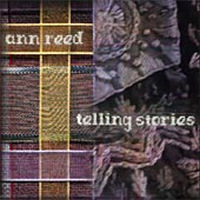 Listening to Minnesota artist Ann Reed’s CD “Telling Stories” (a gift from my friend L), I was thinking about the importance of telling stories in our lives.
Listening to Minnesota artist Ann Reed’s CD “Telling Stories” (a gift from my friend L), I was thinking about the importance of telling stories in our lives.
Especially for women – telling our story and stories from our lives – is the only way to confront the “narrative of the lie” or the story our culture gives us. This story frequently confines women to certain roles, certain life paths and certain ways of being in the world that limit and restrict what women can do.
For example, believing that there is a “public sphere” and “private sphere” and relegating women to the private sphere, effectively removes our voices from public life. It also removes our rights since these rights are often considered not applicable to private sphere or home life. Thus, women who work at home may be considered to be doing less valuable work, typically aren’t paid, may be subject to emotional, physical or domestic abuse, may be inculturated to serve others even when it means denying one’s own education, development, talents or gifts.
Someone once admonished me to “stop telling stories.” It was interesting that the request was not to “stop lying” – because telling about my own experience certainly was not lying. But it was sharing a truth in my own experience that confronted the lie being told by the larger tribe, clan or group.
How have you confronted the lies told in your family, group or community?
How does your story differ from the story others relate about you?
In Christianity, gospel values hinge on our ability to tell the stories. We are not our stories. But scripture stories and our own stories can expand our ideas of who we are and what we can do.
Like Ann Reed, every chance you get – tell stories!
You may also like “What is Your Story?” and “Secrets.”
thank you for the info, it really helps.
Would be great if we could read your blog posts everyday. Congrats for the hard work.